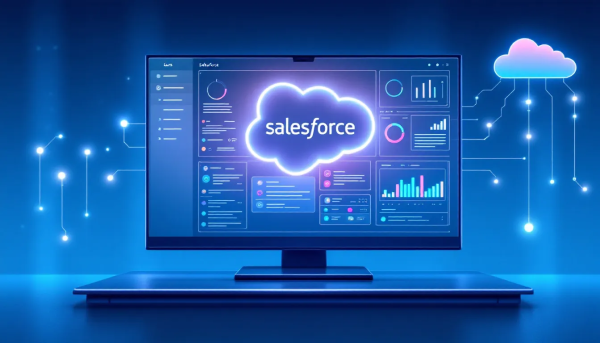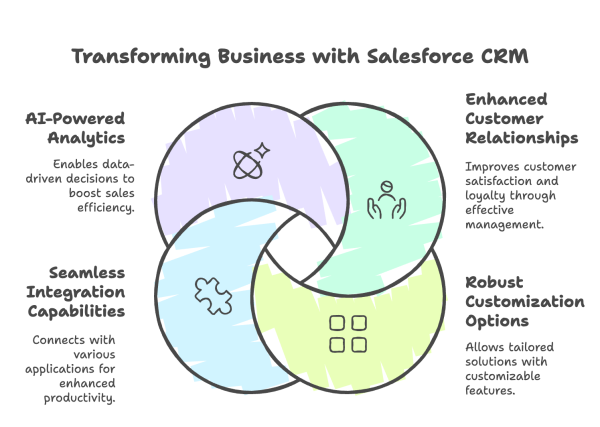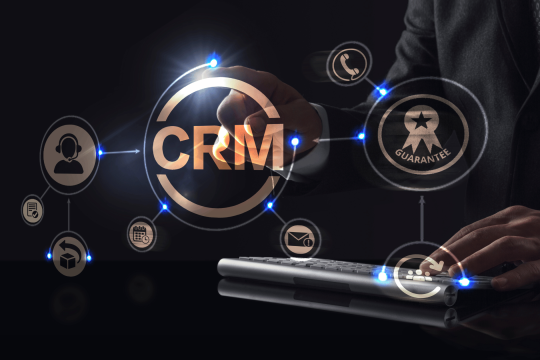Your business CRM (customer relationship management) will impact customer relationships, sales efficiency, and overall growth. This is why choosing the right CRM is critical. Salesforce is one of the most well-known and widely used platforms available, but does it meet your company's needs?
This Salesforce CRM review explores its core features, setup process, integration capabilities, and real-world application. We’ll review the platform's strengths and weaknesses, compare it to alternatives, and help you determine whether Salesforce is the right solution for you.
- What Is Salesforce CRM
- Setting Up Salesforce CRM
- Design & Usability
- Customization Capabilities
- Integration Capabilities
- Benefits of Using Salesforce CRM
- Customer Support and Community Resources
- Pricing and Value for Money
- Honest Feedback from Real Users
- Alternatives to Salesforce CRM
- Key Takeaways: Salesforce CRM
- FAQs
What Is Salesforce CRM
Salesforce CRM is a leading customer relationship management platform that enhances customer interactions and streamlines various processes. Known for its robust feature set, Salesforce offers cloud-based contact management, marketing automation, and customizable dashboards. Its signature features include extensive third-party integrations, AI-powered analytics through Einstein, and a vast library of applications via the AppExchange marketplace. Tailored for companies of all sizes, Salesforce CRM goes beyond covering the CRM basics and is widely regarded as one of the most capable CRMs available.
Setting Up Salesforce CRM
Setting up Salesforce is crucial to leverage the platform's features and full potential. The process can be complex and requires a thorough understanding of your business's needs and IT capabilities. Initially, businesses must outline their objectives and determine their key CRM features. Salesforce provides a step-by-step guide and a wealth of resources through its Trailhead platform, which offers training modules and courses to aid the setup process.
Setup involves configuring the platform to align with your company's internal processes, including customizing dashboards, fields, and workflows to capture your sales pipeline. The learning curve can be steep, but when set up optimally, Salesforce's extensive customization options and functions can drastically improve business workflows and productivity.
For those without extensive IT resources, it may be beneficial to consider hiring a Salesforce consultant or utilizing Salesforce's professional services to ensure a smooth (and proper) setup. Salesforce also offers a 14-day free trial to explore the platform's capabilities and assess its fit before committing. Proper planning and leveraging available resources are strongly advised.
Design & Usability
The platform's interface uses a modern aesthetic with clean lines and functional layouts that improve UI/UX (user interface and experience). The "Lightning Experience" features streamline navigation, allowing users to access features and data effortlessly. This design philosophy reduces cognitive load, enabling users to complete tasks more efficiently.
Salesforce's design is responsive and accessible and adapts seamlessly to various devices, allowing users to manage customer relationships in the office or on the go. The mobile app extends this usability, offering full CRM functionality at one's fingertips.
The Salesforce design and capabilities make it a powerful CRM that enhances productivity and fosters customer success. Its intuitive interface and advanced customization options empower businesses to tailor the platform to their requirements, driving efficient customer relationship management and promoting success.
Customization Capabilities
Salesforce stands out for its extensive customization options, making it an exceptionally versatile and customizable software. Users can tailor the CRM to fit their unique processes by creating custom dashboards, personalizing fields, and automating workflows. The CRM's ability to meet the diverse needs of various industries and business models is a significant advantage of the software.
Custom dashboards are a highlight, offering dynamic reporting features that users can easily adjust. By adding widgets and incorporating text and images, businesses can visualize key metrics and make informed decisions based on real-time data. Customized dashboards and enhanced analytics features mean companies can track performance and identify growth opportunities effectively.
Salesforce also leverages AI for workflow automation, streamlining processes to boost efficiency. Administrators can customize fields, page layouts, and workflows, aligning them with specific sales processes. This level of customization empowers businesses to create a CRM environment that supports their strategic goals and operational demands.

Integration capabilities of Salesforce with third-party applications.
Integration Capabilities
Salesforce has extensive integration options. Salesforce's AppExchange marketplace has over 7,000 apps that users can integrate into their CRM. This business software marketplace significantly extends the platform’s functionality through third-party integrations.
You can integrate Salesforce with popular apps like Mailchimp, Zendesk, QuickBooks, and Jira. These integrations make the platform more usable and allow businesses to connect their existing tools and processes to Salesforce. The robust API support with standard HTTP methods, JSON or XML responses, and various operation types like REST and SOAP make integration even more manageable.
These integration options are invaluable for large and growing companies. Connecting Salesforce to other essential operational tools enables collaborative forecasting, opportunity tracking, and increased productivity, making Salesforce the centre of all customer relationship management activity.

Benefits of Using Salesforce CRM
Salesforce offers many benefits that can transform how businesses manage customer relationships and streamline operations. Here are some key advantages of the platform:
- Robust Customization Options: Salesforce allows businesses to customize the CRM to their needs through customizable dashboards, fields, and automated workflows. This flexibility ensures that the platform aligns with unique business processes and goals.
- Seamless Integration Capabilities: Salesforce's extensive integration options, including its AppExchange marketplace, allow businesses to connect with third-party applications like Mailchimp, QuickBooks, and Zendesk. This connectivity enhances productivity and ensures a cohesive business environment.
- AI-powered analytics: Salesforce's AI technology, Einstein, offers advanced analytics and insights, enabling businesses to make data-driven decisions in real time. This feature helps with opportunity tracking and lead scoring, increasing sales and success.
Customer Support and Community Resources
Salesforce has customer support through various channels, including over the phone, live chat, email, and self-service options. Reviews describe Salesforce’s support reps as knowledgeable, patient, and genuinely interested in helping, but overall, they suggest dissatisfaction with the support. This mixed feedback means support is available, but there’s room for improvement.
The Trailblazer Community is an excellent resource for Salesforce users. It offers documentation, guides, and peer support. This community-driven platform allows users to share knowledge and collaborate on solutions.
For extra support, Salesforce offers options for a fee, which include 24/7 phone support and dedicated account managers.
Pricing and Value for Money
Salesforce's tiered pricing ranges from $25 to $500 per month per user. This structure suits different business needs, but high costs deter smaller businesses. The starting price of $25 per user per month is above the industry average and positions Salesforce as a premium CRM.
To help make the decision easier, Salesforce offers a 30-day free trial so potential users can try it before they buy. We strongly suggest using this trial period to see if the software meets your needs. However, the lack of a free plan may still prevent startups and small businesses from opting for Salesforce.
The value for money will depend on your business's needs and budget. Salesforce can provide a good ROI for businesses with bigger budgets and complex requirements. However, the cost could pose a barrier for smaller businesses, who might be better off looking into cheaper or free alternatives.
Honest Feedback from Real Users
Salesforce has received various user reviews, reflecting its strengths and weaknesses. On platforms like G2 and Gartner, users frequently commend its comprehensive features and integration capabilities. For instance, on G2, a user named Emily R. highlighted how "Salesforce's extensive integration options have streamlined our sales processes, enhancing overall efficiency."
Nevertheless, the platform's complexity and cost are common concerns for smaller businesses. A review by Michael T. on Gartner noted that "while Salesforce offers powerful tools, the setup can be daunting without sufficient IT support, and the pricing structure may not suit smaller budgets."
Industry experts advise that Salesforce is best suited for larger businesses with the resources to maximize its potential. Organizations with dedicated IT teams and a need for extensive customization will benefit the most. However, small businesses or those new to CRM software might find the platform's complexity and cost prohibitive, potentially benefiting more from more straightforward and affordable CRM solutions.
Alternatives to Salesforce CRM
Salesforce is a powerful CRM platform, but its cost and complexity can overwhelm many small businesses. Fortunately, several alternatives provide CRM features at a lower price point, making them more accessible for small businesses, startups, or solopreneurs. Here are some great options to consider:
- Pulse CRM – A comprehensive CRM solution that includes all features in every plan, starting at just $49 per month. Pulse offers full setup assistance, including data import, automation, email marketing, and custom workflows, ensuring businesses maximize their CRM investment.
- HubSpot CRM offers a free CRM plan with 24/7 customer support, making it ideal for budget-conscious businesses. The plan includes essential contact management tools, sales pipelines, and marketing automation.
- Monday CRM – Known for its user-friendly visual interface and forecasting tools. With plans starting at $28 per user, it’s a cost-effective alternative to Salesforce, which still delivers strong CRM capabilities.
While Salesforce remains a top-tier CRM, businesses should carefully assess their needs and budget before committing. Alternatives like Pulse, HubSpot, and Monday CRM offer affordable, user-friendly solutions that help companies to manage customer relationships without the steep learning curve or price tag.
- Highly customizable
- Extensive analytics
- Strong third-party integrations
- Steeper learning curve
- Higher cost
- No hidden costs
- Comprehensive setup and support
- All features in every tier
- Limited scalability for large enterprises
- Less known brand
- Seamless integration
- Powerful analytics
- Personalization at scale
- Can be expensive
- Some limitations for enterprises
- Highly visual interface
- Customizable workflows
- Project management integration
- Expensive for larger teams
- Learning curve for customizations
Key Takeaways: Salesforce CRM
The key takeaways from this Salesforce review are:
- Suited for businesses with greater IT resources and bigger budgets. With extensive customization and integration capabilities and a more complex setup and learning curve, Salesforce can require more IT resources and tech capabilities that smaller organizations might not have. On top of that, its higher price tag per user and lack of a free plan make it less affordable than other CRMs on the market.
- Access to the Salesforce ecosystem and products—the infrastructure and capabilities that Salesforce offers are significant relative to other CRMs available. With Salesforce, you'll have access to an expansive library of third-party integrations (the AppExchange marketplace); just be wary of additional add-on costs.
- With access to Salesforce's AI technology, Einstein leverages machine learning to understand customer data, generate insights, and deliver opportunity and lead scoring. This allows sales teams to identify top leads and increase efficiency.
- Powerful but potentially overwhelming customization options—Salesforce offers extensive personalization through custom dashboards, fields, and automated workflows. The sheer number of options can create a steep learning curve that may slow initial adoption and require dedicated or special training.
FAQs
Salesforce is best suited for medium—to large-sized enterprises, particularly those in financial services and large sales teams. Its steeper price tag and more complex setup can make it less accessible and affordable for some.
Setting up Salesforce can take a few days to several weeks, depending on your specific requirements and available IT resources. While Salesforce can support the initial setup, assessing your internal capabilities and needs helps for a smoother implementation process.
To ensure safety during the software's setup, implement multi-factor authentication (MFA), enforce login restrictions based on IP addresses, adhere to the principle of least privilege, and utilize the Salesforce Health Check tool to manage security settings and identify vulnerabilities. These measures will significantly enhance your system's level of security.
Salesforce provides extensive customization options such as custom dashboards, personalized fields, automated workflows, and AI-driven analytics, allowing users to adapt the platform to their needs and demands.
Yes, HubSpot and Monday CRM are excellent alternatives to Salesforce. They offer competitive features at a lower cost. HubSpot has a free plan, albeit with fewer features.

